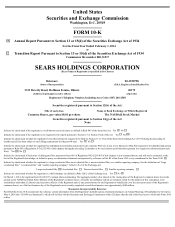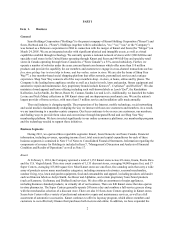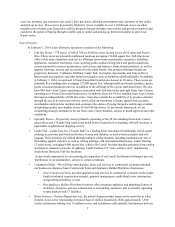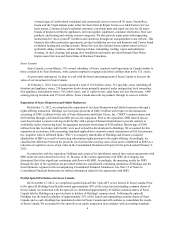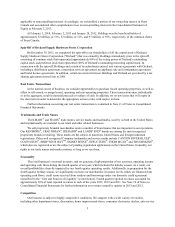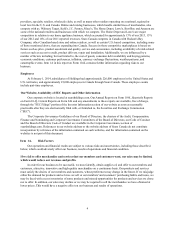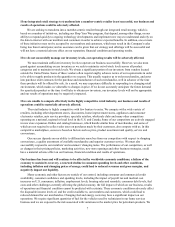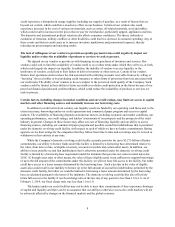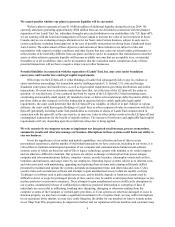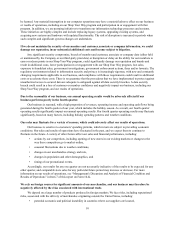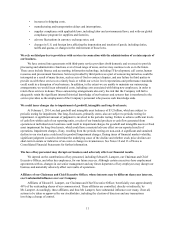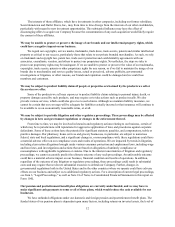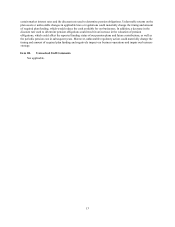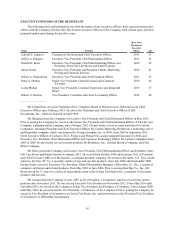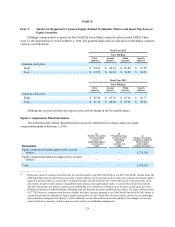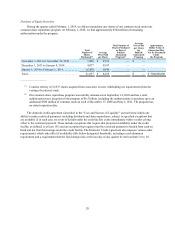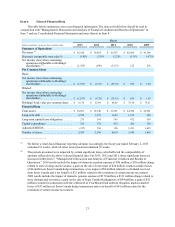Sears 2013 Annual Report Download - page 11
Download and view the complete annual report
Please find page 11 of the 2013 Sears annual report below. You can navigate through the pages in the report by either clicking on the pages listed below, or by using the keyword search tool below to find specific information within the annual report.11
• increases in shipping costs,
• manufacturing and transportation delays and interruptions,
• supplier compliance with applicable laws, including labor and environmental laws, and with our global
compliance program for suppliers and factories,
• adverse fluctuations in currency exchange rates, and
• changes in U.S. and foreign laws affecting the importation and taxation of goods, including duties,
tariffs and quotas, or changes in the enforcement of those laws.
We rely on third parties to provide us with services in connection with the administration of certain aspects of
our business.
We have entered into agreements with third-party service providers (both domestic and overseas) to provide
processing and administrative functions over a broad range of areas, and we may continue to do so in the future.
These areas include finance and accounting, information technology, including IT development, call center, human
resources and procurement functions. Services provided by third parties as a part of outsourcing initiatives could be
interrupted as a result of many factors, such as acts of God or contract disputes, and any failure by third parties to
provide us with these services on a timely basis or within our service level expectations and performance standards
could result in a disruption of our business. In addition, to the extent we are unable to maintain our outsourcing
arrangements; we would incur substantial costs, including costs associated with hiring new employees, in order to
return these services in-house. These outsourcing arrangements also carry the risk that the Company will fail to
adequately retain the significant internal historical knowledge of our business and systems that is transferred to the
service providers as the employment of the Company's personnel who possess such knowledge ends.
We could incur charges due to impairment of goodwill, intangible and long-lived assets.
At February 1, 2014, we had goodwill and intangible asset balances of $3.2 billion, which are subject to
periodic testing for impairment. Our long-lived assets, primarily stores, also are subject to periodic testing for
impairment. A significant amount of judgment is involved in the periodic testing. Failure to achieve sufficient levels
of cash flow within each of our reporting units, or sales of our branded products or cash flow generated from
operations at individual store locations could result in impairment charges for goodwill and intangible assets or fixed
asset impairment for long-lived assets, which could have a material adverse effect on our reported results of
operations. Impairment charges, if any, resulting from the periodic testing are non-cash. A significant and sustained
decline in our stock price could result in goodwill impairment charges. During times of financial market volatility,
significant judgment is used to determine the underlying cause of the decline and whether stock price declines are
short-term in nature or indicative of an event or change in circumstances. See Notes 12 and 13 of Notes to
Consolidated Financial Statements for further information.
The loss of key personnel may disrupt our business and adversely affect our financial results.
We depend on the contributions of key personnel, including Edward S. Lampert, our Chairman and Chief
Executive Officer, and other key employees, for our future success. Although certain executives have employment
agreements with us, changes in our senior management and any future departures of key employees may disrupt our
business and materially adversely affect our results of operations.
Affiliates of our Chairman and Chief Executive Officer, whose interests may be different than your interests,
exert substantial influence over our Company.
Affiliates of Edward S. Lampert, our Chairman and Chief Executive Officer, beneficially own approximately
48% of the outstanding shares of our common stock. These affiliates are controlled, directly or indirectly, by
Mr. Lampert. Accordingly, these affiliates, and thus Mr. Lampert, have substantial influence over many, if not all,
actions to be taken or approved by our stockholders, including the election of directors and any transactions
involving a change of control.

